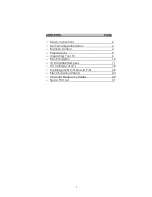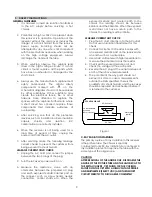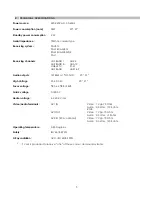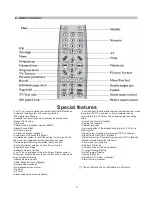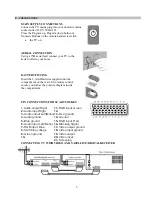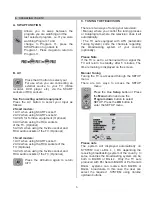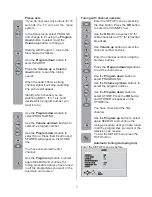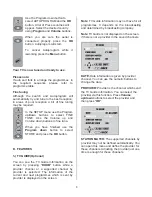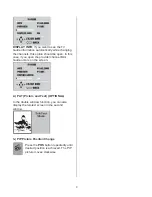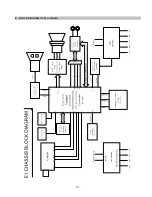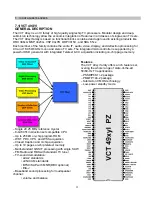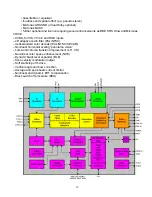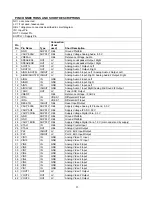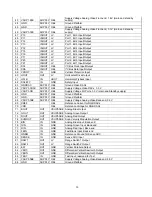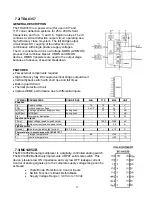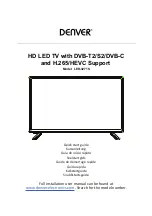
2
1.
SAFETY INSTRUCTIONS
.
GENERAL GUIDELINES
1.
It is advised to insert an isolation transformer
in the AC supply before servicing a hot
chassis.
2.
Potentials as high as 33KV are present when
this receiver is in operation. Operation of the
receiver without the rear cover involves the
danger of a shock hazard from the receiver
power supply. Servicing should not be
attempted by any one who is not competent
with the precautions necessary when working
on the high voltage equipment. Always
discharge the anode of the tube.
3.
When servicing observe the original lead
dress in the high voltage circuits. If a short
circuit is found, replace all the parts which
have been overheated or damaged by the
short circuit.
4.
Always use the manufacturer’s replacement
safety components. The critical safety
components marked with
on the
schematics diagrams should not be replaced
by other substitutes. Other substitute may
create the electrical shock, fire or other
hazards. Take attention to replace the
spacers with the originals. Furthermore where
a short circuit has occurred, replace those
components that indicate evidence of
overheating.
5.
After servicing, see that all the protective
devices such as insulation barriers, insulation
papers, shields and isolation R-C
combinations are correctly installed.
6.
When the receiver is not being used for a
long time of period of time, unplug the
power cord from the AC outlet.
7.
After servicing make the following leakage
current checks to prevent the customer from
being exposed to shock hazard.
LEAKAGE CURRENT COLD CHECK
1.
Unplug the AC cord and connect a jumper
between the two prongs of the plug.
2.
Turn the receiver’s power switch on.
3.
Measure the resistance value with an
ohmmeter, between the jumpered AC plug
and each exposed metallic cabinet part on
the receiver, such as screw heads, aerials,
connectors, control shafts etc. When the
exposed metallic part a return path to the
chassis the reading should be between
4Mohm and the 20Mohm. When the exposed
metal does not have a return path to the
chassis, the reading must be infinite.
LEAKAGE CURRENT HOT CHECK
1.
Plug the AC cord directly in to the AC outlet.
Do not use an isolation transformer for this
check.
2.
Connect a 2Kohm 10W resistor in series with
an exposed metallic part on the receiver and
an earth, such as a water pipe.
3.
Use an AC voltmeter with high impedance to
measure the potential across the resistor.
4.
Check each exposed metallic part and
check the voltage at the each point.
5.
Reverse the AC plug at the outlet and repeat
each of the above measurements.
6.
The potential at the any point should not
exceed 1.4 Vrms. In case a measurement is
outside the limits specified, there is the
possibility of a shock hazard, and the receiver
should be repaired and rechecked before it
is returned to the customer.
HOT CHECK CIRCUIT
AC-Voltmeter
TO INSTRUMENTS
EXPOSED
METALLIC PARTS
Water pipe
(earth)
2 K Ohm
Figure 1
X-RAY RADIATION WARNING
The primary source of X-ray radiation in this receiver
is the picture tube. The chassis is specially
constructed to limit X-ray radiation. For continued X-
ray radiation protection, replace the tube with the
same type of the original one.
CAUTION
AFTER REMOVAL OF THE ANODE CAP, DISCHARGE THE
ANODE OF THE PICTURE TUBE AND THE ANODE CAP TO
THE METAL CHASSIS, CRT SHIELD, OR THE CARBON
PAINTED ON THE CRT WITH A HIGH VOLTAGE PROBE
AND MULTIMETER (SELECT VDC) AND THEN SHORT
CIRCUIT DIRECTLY TO DISCHARGE COMPLETELY
Summary of Contents for K1 CHASSIS
Page 1: ...Service Manual K1 CHASSIS ...
Page 11: ...10 6 BLOCK DIAGRAM OF E1 CHASSIS ...
Page 30: ...29 11 CHANNEL FREQUENCY TABLE ...
Page 31: ...30 ...
Page 38: ......


